新人教版高中英语必修3Unit 1 Festivals and Celebrations-Listening &Speaking&Talking教学设计
-
- 页数:8页
- 字数:约 13413 字
- 大小:480.80KB
- 格式:.docx
- 版本:Office2016及以上版本
- 作者:wuwei-ppter
Unit 1 Festivals andCelebrations-Listening &Speaking&Talking教学设计
Thetheme of this section is “Talk about festival activities and festivalexperiences”.
Festival and holiday is a relaxing andinteresting topic for students. This part talks about the topic from the dailylife of students’. In the part A ---Listening and Speaking, there are threeconversations among different speakers from three countries(Japan, Rio andChina), where the speakers are participating in or going to participate in thefestivals and celebrations. So listening for the relationship among them is afundamental task.

Actually, with the globalization and more internationalcommunication, it is normal for Chinese or foreigners to witness differentfestivals and celebrations in or out of China. In the Conversation 1, a foreignreporter is interviewing a Japanese young girl who just had participated in theceremony of the Coming-of-Age Day on the street and asking her feeling aboutthe ceremony and the afterwards activities. Conversation 2, Chinese girl Li Meiis witnessing the Rio Carnival for the first time, and her friend Carla givesher some advice on the costumes which enables her to match with the carnival tohave a good time. Conversation 3, a Chinese guide is showing a group of foreignvisitors around the Lantern Festival and introducing the customs of thefestival to them. The three conversations have a strong vitality and insert thefestival and cultural elements from different countries. So perceiving thefestivals and cultures from different countries is the second task. At the same time, the scripts also insert thetargeted grammar --- v-ing as attributive and predicative, which students canperceive and experience in a real context and make a road for the furtherstudy. That is the third task. In the Part B--- Listening and Talking, thetheme is “Talk about festival experience”, which is the common topic in ourdaily conversations. During the conversation, Song Lin, a Chinese student,asked Canadian friend Max about how to spend Christmas. In the conversation, SongLin talked about experience and the feelings during the Chinese SpringFestival, during which there are not only some enjoyable things but someunpleasant things. After the listening, perhaps students find there are somesimilarities between Christmas and the Chinese Spring Festival as there aresome differences in the origins and celebrations. For example, people alwaysvisit friends and relatives, decorate their houses, have a big dinner together,chat and give presents to each other.
1. Students learn to listen for relationship among the speakersaccording their attitudes.
2. Students learn to predict the content of listening and try to get thedetailed information.
3. Students can use background knowledge and relative words andexpressions to describe the festivals and festival activities.
4. Students can talk about their own festival experiences and expresstheir emotions with proper sentences.
1. Students learn to listen for relationship among the speakersaccording their attitudes.
2. Students learn to predict the content of listening and try to get thedetailed information.
3. Students can use background knowledge and relative words andexpressions to describe the festivals and festival activities.
4. Students can talk about their own festival experiences and expresstheir emotions with proper sentences.
Part AListening and Speaking--- Talk about festival activities
Step 1Lead in--Small talk
There are manytraditional festivals in our country. Can you list them and the activities inthe festivals ?
Answers:
1. Spring Festival: eat dumplings; have abig dinner with family together; pay a new year’s visit to friends andrelatives
2. the Lantern Festival: admire all kindsof lanterns; guess riddles; eat Yuanxiao
3. TombSweeping Festival: clean tombs; light incense; honour our ancestors
4. the Dragon Boat Festival:eat zongzi; enjoy the dragon boat races;
5. Mid-Autumn Festival: admire the moon; eat mooncakes; have a big meal withfamily
6. Double-Ninth Day: visit the old, especially the alone; help them as much aspossible
....
Step 2 Before-listening
1. Read the phrases and writedown the Chinese meaning.
1)wear traditional costumes_______________ 2)march along the streets _______________
3)attend the ceremony _________________ 4)watch samba dance _________________
5)dress up in carnival costumes ______________ 6)guess riddles _________________
7)receive congratulations from_______________ 8)give performances _________________
Answers: 1)着传统服饰 2)游街 3)参加仪式 4)观赏桑巴舞
5)着狂欢服 6)猜谜语 7)收到祝福 8)进行表演
2.Look at thethe pictures and choose the phrases above to describe each festival.
Chinese Lantern Festival RioCarnival JapaneseComing-of-Age Day
2. 6. 2. 4. 5. 8 1. 3. 7
Step 3 While-listening
1. Listen and write the order of theconversations next to the names of the festivals above. Then match eachconversation with the relationship between the speakers below.
2.
__________ a tour guide and members of a tour group
__________ an interview and an interviewee
__________a reporter and a tourist
__________ two friends
Answers: order: Chinese Lantern Festival: 3; Japanese Coming-of-Age Day: 1 RioCarnival: 2
Chinese Lantern Festival: a tour guide and members of a tourgroup(Conversation 3)
Coming-of-Age: an interviewer and an interviewee(Conversation 1)
Rio Carnival: two friends(Conversation 2)
3. Listen againand complete the sentences with the correct words.
4. 1) In Conversation 1, the woman is wearing___________ colours. It took her a long time to do her hair and make-up, and toget ____________. She is going to meet her ___________soon.
5. 2) In Conversation 2, Carla advises Li Meito change her ___________. This is because the weather is ___________ and theywill be outside for a long time.
6. 3) In Conversation 3, the people areenjoying the ___________show.
Answers: 1) bright; dressed; family 2) dress and shoes; hot 3) lantern
7. Listen againand make a list of each festival’s activities.
8. Chinese Lantern Festival:___________________________________________________________
9. Coming-of-Age Day:________________________________________________________________
10. Rio Carnival:______________________________________________________________________
11. Answers: Chinese Lantern Festival:guess riddles; see the colorful lanterns; watch the dragon or lion dances; eatyuanxiao
Coming-of-Age Day: girls do their hair and make-up; weartraditional costumes; attend the Coming-of-Age ceremony; say congratulations;have a party.
Rio Carnival: wear carnival costumes; march along the streets;dance
Step 4 Post-Listening---Speaking
In pairs, discuss which of these festivals attracts you the most andwhy.
A: I think the Rio Carnival would be the mostexciting.After all, as you know, I love to dance!
B:I love dancing, too, but I’m not sure I’d enjoy it insuch hot weather.
A: So which festivals do you like best ?
B: I like the Coming-of-Age Day best.
A: Why ?
B: Well, I think it would be neatto dress up in traditional costumes and attend a ceremony to mark becoming anadult. It is a special time, and so it would be nice to celebrate it with myfriends and family.
A: That’s true, but the LanternFestival also has its good points.
B: What do you like best about it?
A: Well, the lanterns are pretty cool to lookat, and the dragon dances can be quite fun. But I like eating yuanxiao with myfamily most of all.
Step 5Pronunciation---Assimilation(同化)
音的同化是英语发音中的一个重要现象, 语流中两个邻近的不同的音, 其中一个受到另一个的影响而变得跟它相同或相近, 叫同化。大致可分为以下三类:
1. 因唇形的影响而发生的同化:
[n], [d], [t]在双唇音[m], [b], [p]前面被同化, 如ten pairs; getme; that boy
2. 因声带的影响而发生的同化:
(1)浊辅音可变为清辅音。例如: of course
(2)清辅音可变为浊辅音。例如: like that
本音
同化音
举例
[s]+[ʃ]
[ʃ]
this shop; nice shoes
[z]+[ʃ]
[ʃ]
those sheep; Has she come?
[t]+[j]
[tʃ]
situation; natural; next year
[d]+[j]
[dʒ]
graduate; Would you like it?
[s]+[j]
[ʃ]
assure; Don’t miss your train.
[z]+[j]
[ʒ]
as usual; as you know
3. 因发音部位的影响而发生的同化:
Step 6 Exercise
1. Listen and read aloud the wordsor phrases to you partner. Pay attention to the change in the pronunciation ofthe bold letters.
2. 1. duty; education 2 use; usually 3. news, newspaper 4. is, issue
3. 5. last year 6. in bed 7. those shirts 8. as you see
4. Listen to the following sentences, payingattention to the consonants in the bold. How do their pronunciations changewhen they are read in the sentences ?
1.Did youenjoy the holiday ?
2.2. Miss,congratulations on becoming an adult!
3.3. It’llbe too tiring to walk or dance for a long time in those shoes.
4.4. I washoping to hear that you had a great time throughout.
5.5.Children then take part in Easter egg hunts to find the eggs and winprizes.
6.6. InMexico, the Day f the Dead is celebrated between October 31st andNovember 2nd.
Part BListening and Talking---Talk about festival experiences
Step 1 While-listening---Task 1
Song Lin and Max are talking about a recent festival experience. Listento their conversation and answer the questions.
1. What festival isMax talking about?
2. _____________________________________________________________________________
3. 2. What did Max doduring the festival ?
4. _____________________________________________________________________________
5. 3. What dishes didMax’s mother cook ?
6. _____________________________________________________________________________
7. 4. What did Maxand his family do during and after the dinner ?
8. _____________________________________________________________________________
9. 5. What was thebest part of the festival ?
10. _____________________________________________________________________________
11. Answers :1. Max istalking about his Christmas experience with his family.
12. 2. He decoratedthe Christmas tree and put presents under it. Then helped his mum prepare forthe family dinner on Christmas Eve.
13. 3. She cookedroasted turkey, mashed potatoes, Christmas pudding, and apple pie.
14. 4. They sharedstories and told jokes during the dinner. They played games with the childrenafterwards.
15. 5. The best partwas opening their presents on Christmas morning.
Step 2While-listening---Task 2
Listen again andtick the phrases that Max or Song Lin uses.
Expressing feelings and emotions
It was fantastic! How wonderful! How exciting!
That’s amazing It was great fun! It’s veryexciting.
It was greatto... I’m really happythat... I’m pleased to...
Step 3 Post listening
Read theconversation below and underline the phrases that express feelings aboutfestivals. Role-play the conversation with your partner.
您可能喜欢的文档
查看更多
新人教版高中英语必修3Unit 3 Diverse Cultures-Listening &Speaking&Talking教学设计
- 页数:7页
- |大小:714.50KB

新人教版高中英语必修3Unit 2 Morals and Virtues-Listening &Speaking&Talking教学设计
- 页数:7页
- |大小:309.97KB

新人教版高中英语必修3Unit 4 Space Exploration-Listening&Speaking&Talking教学设计二
- 页数:5页
- |大小:184.13KB

新人教版高中英语必修3Unit 5 The Value of Money-Listening &Speaking&Talking教学设计
- 页数:6页
- |大小:843.36KB
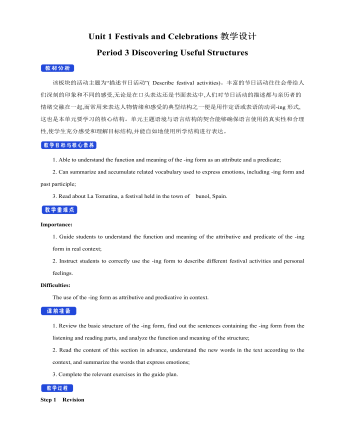
新人教版高中英语必修3Unit 1 Festivals and Celebrations教学设计二
- 页数:4页
- |大小:91.39KB
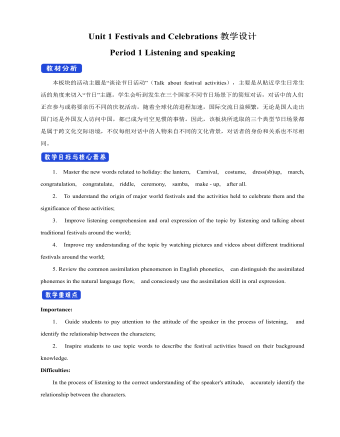
新人教版高中英语必修3Unit 1 Festivals and Celebrations教学设计一
- 页数:7页
- |大小:565.96KB
热门课件教案
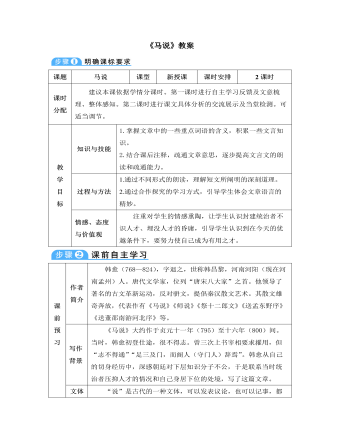
部编版语文八年级下册《马说》教案
- 页数:8页
- |大小:367.50KB
- 课件教案
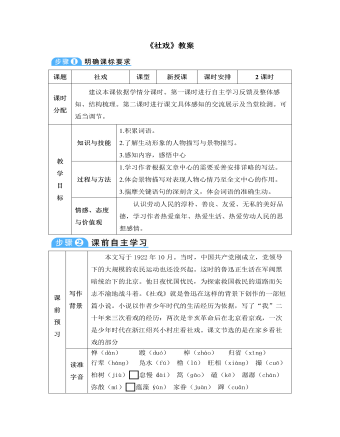
部编版语文八年级下册《社戏》教案
- 页数:8页
- |大小:340.00KB
- 课件教案
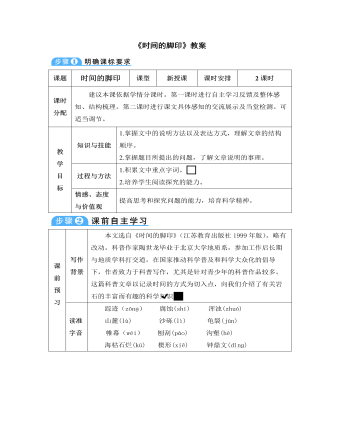
部编版语文八年级下册《时间的脚印》教案
- 页数:4页
- |大小:511.50KB
- 课件教案
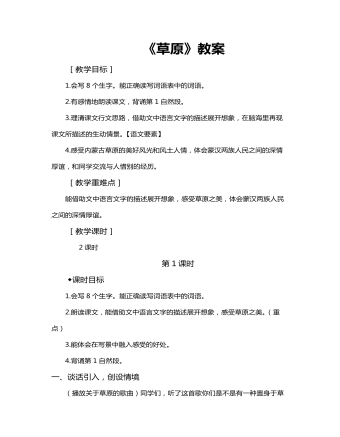
部编版六年级语文上册《草原》教案
- 页数:6页
- |大小:265.86KB
- 课件教案
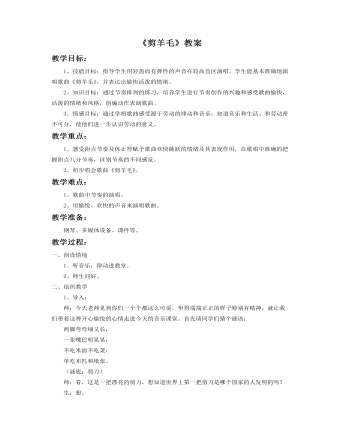
《剪羊毛》教案
- 页数:3页
- |大小:33.50KB
- 课件教案
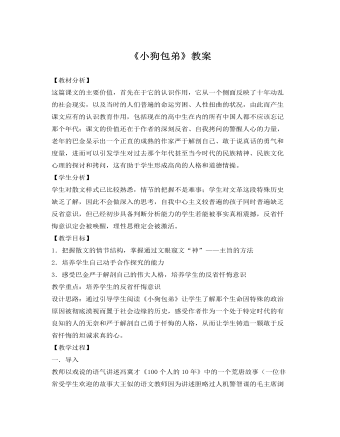
人教版高中语文《小狗包弟》教案
- 页数:8页
- |大小:29.21KB
- 课件教案
今日更新
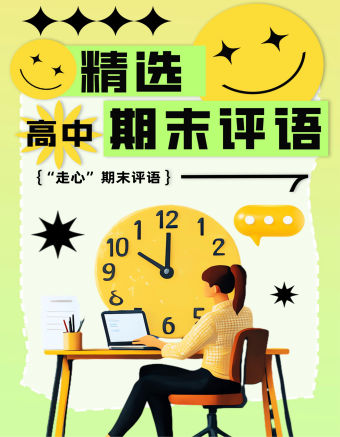
精选高中生期末评语
- 页数:42页
- |大小:7M
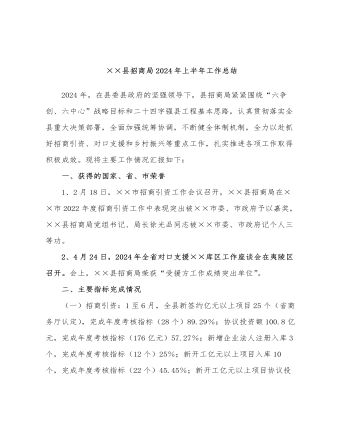
××县招商局2024年上半年工作总结
- 页数:12页
- |大小:142.54KB
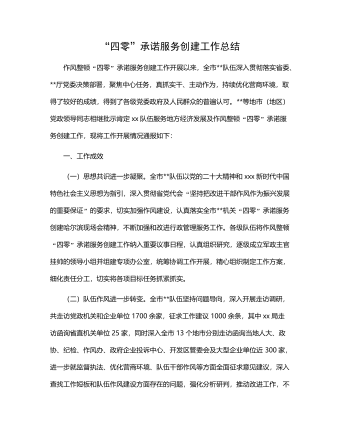
“四零”承诺服务创建工作总结
- 页数:5页
- |大小:39.83KB
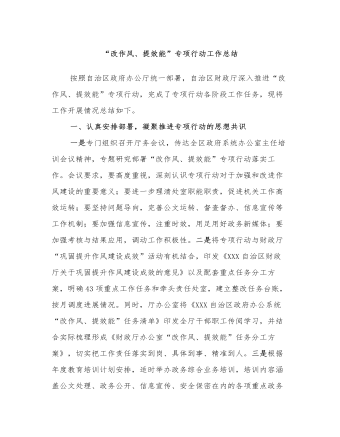
“改作风、提效能”专项行动工作总结
- 页数:6页
- |大小:139.05KB
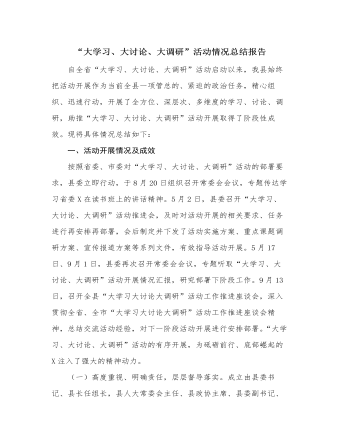
“大学习、大讨论、大调研”活动情况总结报告
- 页数:7页
- |大小:26.12KB
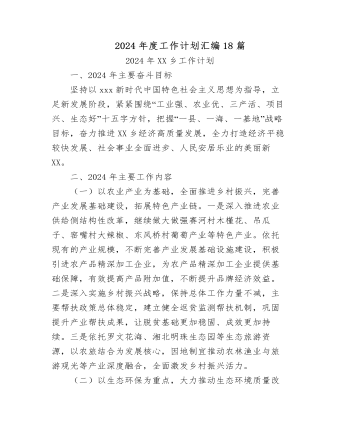
2024年度工作计划汇编(18篇)
- 页数:72页
- |大小:196.93KB






